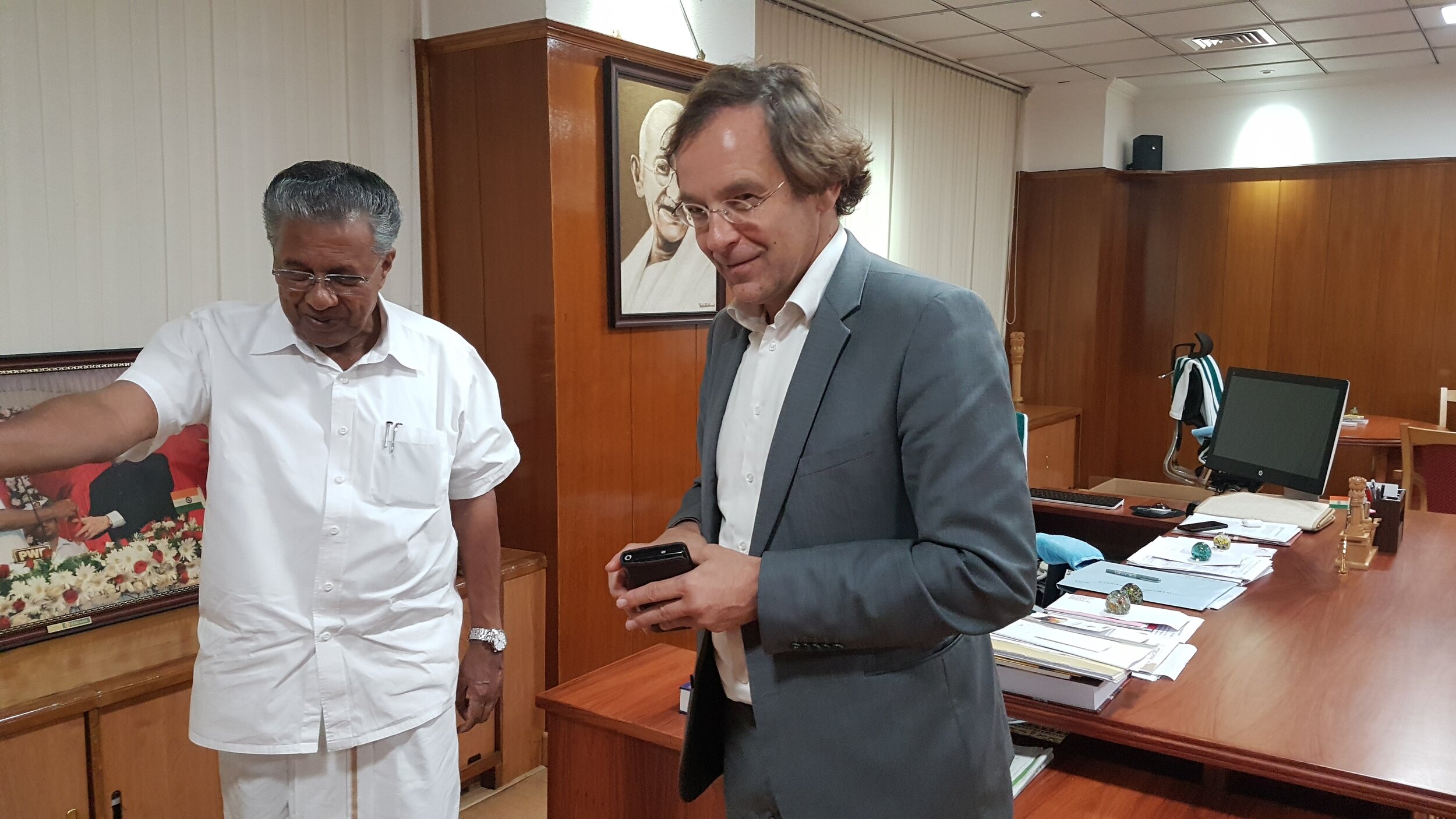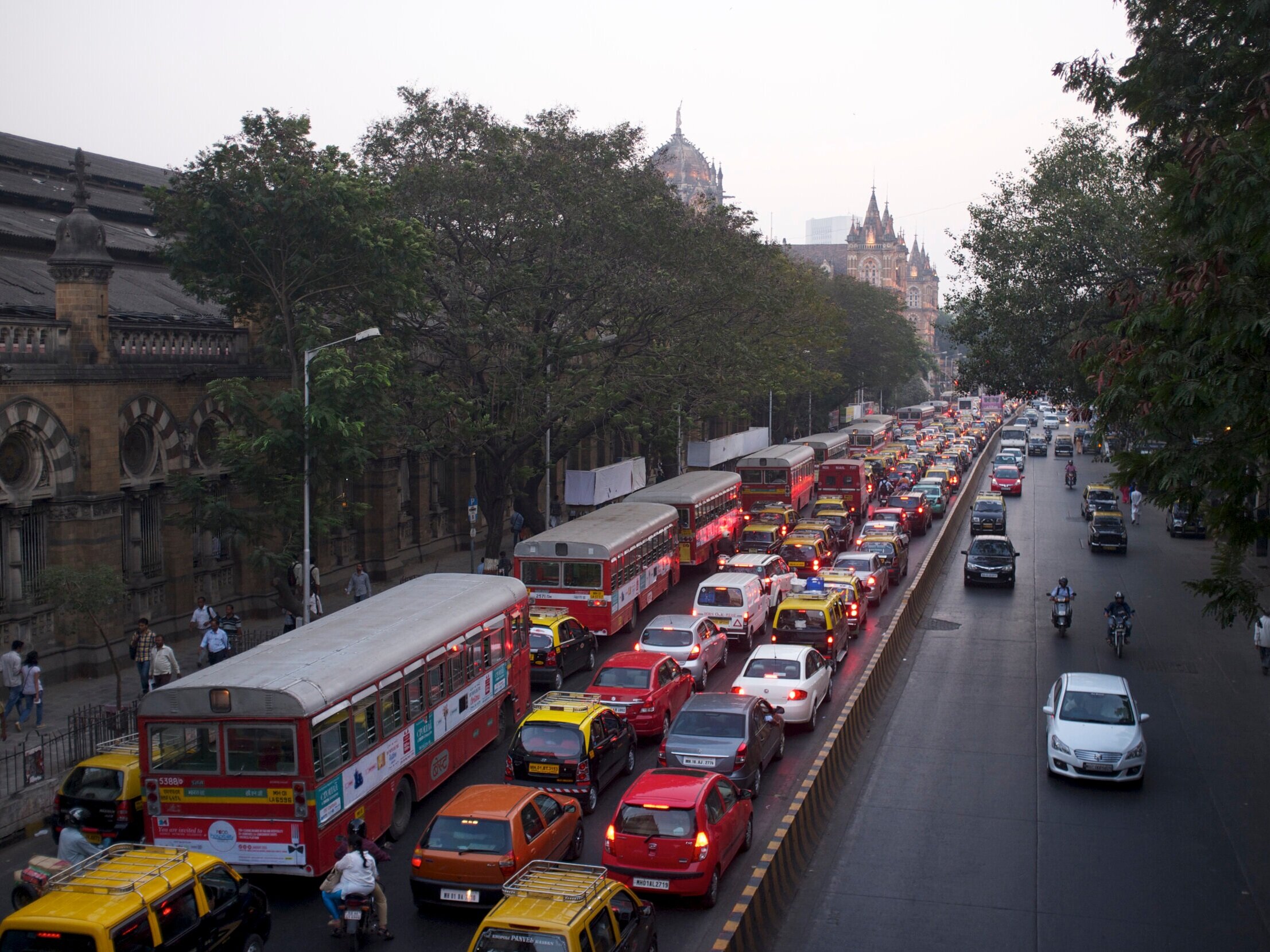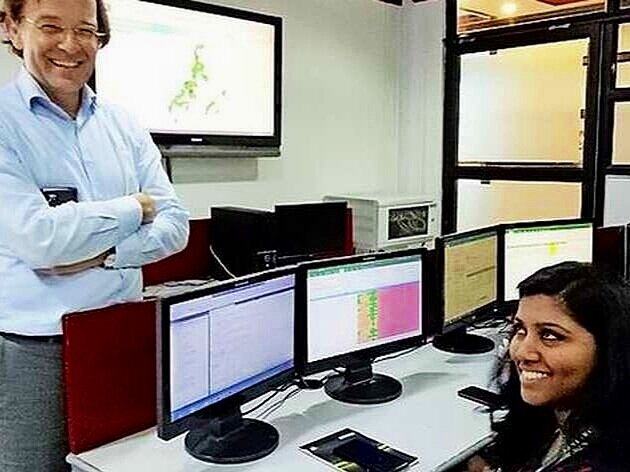ARS Traffic & Transport Technology from The Hague, a leading market player in technological traffic solutions, opened a branch in India twenty years ago to develop software. The company now also sells its software to Indian authorities. "We started step by step and now regularly win large government contracts," says CEO Jan Linssen. "We started very small, with automated traffic control in Patna. Now we are guiding more than 10 million traffic participants in Mumbai in the right direction."
Director Jan Linssen and the Chief Minister of the Indian state of Kerala, Pinarayi Vijayan
"When we started ARS in 1998, traffic information was really still something new, but the realisation that the application of technology was important for traffic management grew rapidly. As a company, we quickly came to the conclusion that we could not achieve our goals with the capacity we had in the Netherlands at that time. So you start looking outside the box," says Linssen. The company spent three years travelling around the world to find the right software developers. After a year in the Balkans and a branch in Argentina, they landed in India in 2001. "We were not unhappy with the set-up in Argentina, but the economy was not going well, the developers' English was poor and the technology sector did not play an important role in the country. We found the opposite in India and on top of that a traffic and transport market with huge potential."
Setting up an Indian branch
The CEO describes the start of the company in India as pioneering. "We had to invent everything ourselves. We started with ten people and were very lucky with our location. At the time, there was only one Tech Park with excellent facilities, fast internet connections and good accessibility. That park was in Trivandrum. Nowadays, a tech company immediately thinks of setting up shop in Bangalore, but we are very happy that we can offer our developers a good living environment with lots of greenery. Moreover, they don't have to queue up for two hours to get to the office.
But there were also plenty of moments of trial and error. "There is much more help available now if you want to start as an international company and you need it more, because it has become a lot more complex to open an office than it was in 2001," says Linssen. "Still, it wasn't easy for us either, we had a lot of pats on the back and had to discover a lot along the way. Fortunately, we already had experience in setting up businesses abroad, so you go in with a flexible attitude. You definitely need that in India, because you don't suddenly understand the culture of this new country you're settling in. For us, it meant: trying, adjusting, introducing a new way, adjusting again, etc. Until you find the right way of working. Until you find the right way of working."
Business culture in India
The fact that all employees in India and the Netherlands are on the same page in terms of working methods is more important for ARS T&T than for other IT companies. Not only is software developed in the Indian office, the route control systems and matrix signs along the Dutch motorways are also monitored from Trivandrum. "We monitor the entire road network in the Netherlands, so if a system fails, due to the time difference, we can repair the system before the rush hour starts." It was therefore important to Linssen from the outset that the team in India would become an extension of colleagues in the Netherlands and not an outsourcing location. "With this approach, it is very important that you don't try to set up a Dutch company in India. You have to find a method whereby you stay close to them. Developing mutual understanding is a requirement."
"India is not an outsourcing location for us, it is our Indian colleagues"
Linssen therefore chose to manage the team tightly from the outset, with clear objectives, the measurement of results and conditions for failure to meet targets. "In IT, assignments are often described in somewhat abstract terms, which sometimes leads to miscommunication. Especially because we in Europe expect a different level of quality than in India. So you have to explain very clearly what you want. The route we have chosen is therefore to lay down our requirements in India at the earliest possible stage and then to ask them to work out the details. What is going to be made? That way, we can determine whether they really have understood our idea and bypass the socially desirable answers that Indians are used to giving."
Winning government contracts in India with a customised product
While setting up the Indian office, Linssen already saw the opportunities for ARS' traffic solutions in India. "The market was just not ready, our solutions were too expensive and too advanced. But his team, who both understood the high-tech possibilities for the European market and were much better versed in the local market, were able to bridge the gap. "We didn't want to compete with Indian companies, their prices and product quality were too low. But our European products were obviously a mismatch. Because our team understood what was technically possible, they came up with realistic adaptations for the Indian market. We moved into the mid-range in terms of price and quality. As a result, we hardly have any competition now. The Indian companies aim too low and the other Western companies aim too high. This gives us the opportunity to win big government contracts.
According to Linssen, winning a tender in India is not that different from winning a tender in the Netherlands. "The price and quality you offer must match the government's demand. The smartest thing to do is to let the client define the minimum quality so that you don't have to fight with the pricefighters and can make a realistic offer." Despite the fact that there seem to be many opportunities in India in this area for international companies, according to the CEO, a tender in India cannot be won from Europe. "A local party always has an edge here and we are lucky to be seen as a local party after 20 years. It's a position you can't buy, but really have to acquire. In addition, Europeans often think that with their advanced technological solutions they can compete, but they do not realise that they are stepping into a country with very enterprising people, who also work for a much lower price. That is a tough nut to crack."
To win a tender, cooperation with local parties is a must
ARS T&tT's smart software solutions alone are often not enough to win the tenders. "We work together with local companies on a fairly regular basis in order to provide a total solution. This may be a company that installs the poles and wires for our traffic control systems, or a company that supplies the hardware for our software. These are often quite tricky collaborations, because such a company suddenly has to deliver much higher quality than they are used to and you don't have the possibility to guide or train them like you would do with your own employees."
Long traffic jams in busy Mumbai
Jan Linssen at the traffic management centre in India
According to Linssen, they have made some serious mistakes here in the past. "For example, we asked a company to lay cables at a depth of 75 centimetres and when problems arose we found out that they were only at 10 centimetres. From situations like that you learn that you have to be on top of things and choose to be physically present at such a project or only pay afterwards if the job is done properly." But Linssen has also learned a lot from the collaborations. "In many cases we also have to listen to them and not just impose our requirements. They often possess knowledge that we do not. We learn something new about India with every collaboration, such as where and how we can buy products and services at a competitive price."
The future offers opportunities for European companies in India
Linssen has high expectations of India's development in the coming years in terms of traffic and transport. "In 2001, China and India were very similar in terms of situation, chaotic and constantly clogged. China has developed tremendously in recent years and India has the potential to take the same step now. That is interesting for European companies because, unlike China, India does not do this itself. If you invest on time, you can benefit from this."



